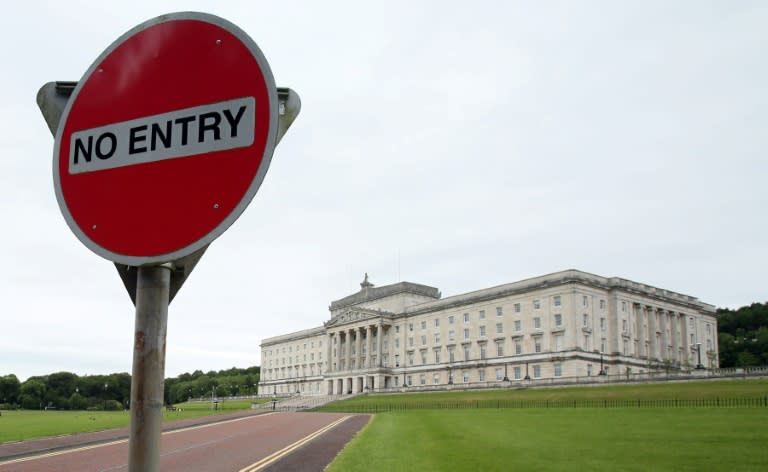Northern Ireland power-sharing talks miss deadline
Northern Ireland's squabbling political parties missed a deadline Thursday to form a power-sharing government after three months of petty wrangling. Talks to restore a semi-autonomous administration in Belfast missed the 4:00 pm (1500 GMT) deadline, with the two main parties, the Democratic Unionists (DUP) and rivals Sinn Fein, blaming each other. London said the negotiations will be allowed to extend until Monday, when Britain's Northern Ireland Secretary James Brokenshire will outline the government's intentions on what happens next if there is still no agreement. The province could be fully governed from London, Brokenshire could call an unwelcome second snap election, or give the parties yet another deadline and yet more time to back down from their entrenched positions. "We are now allowing the parties some space to continue the discussions," British Prime Minister Theresa May's spokeswoman told reporters. "James Brokenshire will make a statement on Monday. Therefore talks can continue beyond the statutory deadline. "We believe that very good progress has been made, we believe that a resolution can be found and we're urging the parties to continue focusing their efforts on achieving it." - Cornerstone of peace process - The power-sharing Northern Ireland Assembly is a cornerstone of the peace process that ended three decades of violent conflict in the province, which is broadly split between Catholic Irish nationalists and Protestants backing the union with Britain. The assembly has powers over issues including health, education, justice and the province's economy. Tensions between the two main parties boiled over in January and Irish republicans Sinn Fein pulled out of the executive, citing frustration with their unionist rivals. That triggered a March 2 snap election in which the conservative DUP saw its lead over socialists Sinn Fein slashed. The major bone of contention is Sinn Fein's insistence on official recognition of the Irish language, which, in the 2011 census, four percent in Northern Ireland claimed they could speak, read and write. Unionists argue that it would add a layer of unnecessary and unaffordable bureaucracy, undermine British culture and would be unfair without similar recognition of the Ulster-Scots dialect cherished by a similarly small number of Protestants. - 'We aren't close': DUP - DUP negotiator Edwin Poots said they were focused on resolving "the issues that really matter", such as health and education. "We aren't close to an agreement. There is considerable work to be done and we believe the ball is in the court of Sinn Fein," he said. Poots said his preference, if a deal could not be reached, would be for government from London to end the "paralysis". The DUP is feeling emboldened since Monday when it agreed a deal in the British parliament with May's Conservative Party to prop up her minority government on matters of confidence, the budget and Brexit. In return, the DUP secured an extra £1.0 billion ($1.3 billion, 1.1 billion euros) for Northern Ireland out of British coffers over the next two years. However, without an executive in Belfast, it could be London ministers who decide how the cash is spent. Sinn Fein's former regional development minster Conor Murphy blamed the Conservative-DUP confidence and supply deal, saying it had "deepened DUP intransigence and arrogance". Their sticking point was a "very simple rights entitlement for people who want to live their lives through the medium of Irish", he said. Murphy said Sinn Fein would not accept Northern Ireland going back to being fully governed from London.



